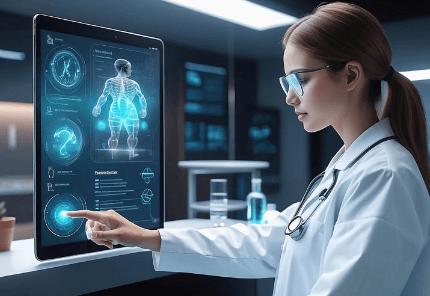How Big Data Is Revolutionizing Healthcare
Big data is fundamentally transforming healthcare by enabling more precise diagnostics and tailored treatments. Advanced analytics and genomic sequencing allow clinicians to interpret complex information rapidly, potentially identifying conditions earlier and customizing therapies to individual patients. This shift toward data-driven decision-making offers promising avenues for improving outcomes and reducing costs. As technology continues to evolve, the full scope of its impact on healthcare delivery and innovation remains an ongoing exploration.
Enhancing Diagnostics and Personalized Treatment
Advancements in big data analytics have significantly transformed diagnostic processes and the development of personalized treatment plans in healthcare. Genomic analysis enables precise identification of individual genetic factors.
AI-powered diagnostics rapidly interpret complex data for accurate, early detection. This innovative synergy empowers clinicians to craft tailored therapies, fostering a new era of autonomous, patient-centered healthcare freedom.
Improving Patient Monitoring and Engagement
The integration of big data analytics into patient monitoring systems has revolutionized the way healthcare providers track health metrics and respond to patient needs in real time.
Remote sensors continuously gather vital data, while advanced patient portals enable engagement and transparency, empowering individuals to monitor their health proactively.
This fusion fosters autonomous, informed health management, enhancing overall care quality and patient satisfaction.
Advancing Research and Disease Prevention
How is big data transforming research and disease prevention efforts in healthcare? By harnessing genetic insights and advanced predictive analytics, researchers can identify risk factors, develop targeted interventions, and customize treatments.
This innovation fosters a proactive approach, empowering individuals with personalized insights and enabling early detection, ultimately enhancing disease prevention and accelerating medical breakthroughs.
Streamlining Healthcare Operations and Management
In what ways does big data enhance the efficiency and accuracy of healthcare operations and management? It enables optimized resource allocation, predictive maintenance, and workflow automation, all while prioritizing data privacy.
Staff training becomes essential, empowering personnel to leverage insights responsibly and innovatively, ultimately fostering a more autonomous, adaptable healthcare ecosystem that values transparency and operational freedom.
See also: turfmillionnaire.co.uk
Conclusion
In conclusion, big data’s integration into healthcare exemplifies the adage that knowledge is power. By enabling precise diagnostics, personalized treatments, and proactive disease management, it fosters a more efficient, patient-centered system. The innovative use of genomic data, AI, and real-time monitoring not only enhances clinical outcomes but also drives cost reductions and operational improvements. As technology advances, harnessing big data will remain crucial for transforming healthcare into a more effective and responsive domain.






